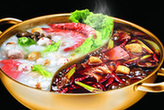The smells of fried scorpions and other exotic insects invade our noses from around the corner, along with the putrid smells marching from the inside of trashcans—filled with rotten Chinese food—placed strategically throughout the street. All of the smells mix together into something tolerable, but at the same time, it is still far from pleasant. To my left Buddhist prayer beads and religious images fill vendors’ tables and walls. John experienced first-hand the bargainer’s rush a few days ago, and so he relates his experience to me of purchasing a midnight-black-colored item on the wall nearby us: a Chairman Mao shoulder bag. It features a profile picture of Mao. Red Chinese characters stand out underneath him. “At first,” John recalls, “the dealer asked for ninety kuai, but I told him that was way too much for me. So, dude, he offered a price of eighty kuai instead. I told him no again. At sixty kuai I told him, ‘I might come back,’ and then I started to walk away. That’s when the vendor looked at me with a big D on his face for Disbelief, and groaned: ‘That’s what they all say!’” John, feeling commiserate for the poor vendor, I guess, says he paused, turned around, talked the vendor down to twenty five kuai, and purchased the Chairman Mao shoulder bag. Ironically he later found the exact same shoulder bag down the street for a mere twenty kuai. The end. John breathes out a barely audible curse: “Dammit!” Score: vendor, one; John, zero.
An elderly woman, a Chinese vendor, grabs my arm, trying her best to get my attention, trying her best to get me to stop and look at her merchandise. I brush off her advance, keep moving, and listen to vendors nearby greeting me in a very, very friendly manner; they gesture for me to come closer, and have smiles shaped like small teacups viewed from the side. All the while they are saying: “Hello, hello!” A little too friendly, I think, taking one step back. While I do not buy anything, John buys a custom-made Chinese seal carving and a copy of a Chinese painting. With no Happy Buddha jewelry in sight, we leave the street market.
After visiting Wangfujing’s English bookstore, which played DJ Okawari’s “Love Letter” as we searched the aisles, John and I return home. I joke with John, calling him Happy Buddha over and over again. As contradictory as it sounds calling John Happy Buddha, he identifies himself as a Christian. From my short experience of Beijing thus far, the Chinese I’ve encountered either show interest or apathy for religion. For example, I once asked a Chinese friend of mine if he adheres to any religious faith. (In fact, I asked him this after a long list of questions involving global warming, Chinese food, Chinese women, China’s space program, the rise of China, and other intriguing issues.) I quote his response verbatim: “I believe in myself.” No talk of Muhammad, Christ, or Moses. Not even Lao Tzu, Confucius, or Buddha. No sign of hostility or love towards religion. Just cold indifference consumed his face, as the steam from our Chinese dumplings infused the air in-between us at the restaurant table. Two flies circled overhead. Silence. In America’s Bible Belt, people show hostility or love towards religion, but cold indifference? Rarely. Judging from my limited experience, religious indifference seems to me a more common attitude in China, even when counting my Buddhist and Baha’i Chinese friends.
The subject inevitably transforms into a simple question: Why did you come to China? “One reason I came to China,” I say to John as I loll in the soft couch, gazing at the white ceiling, “is to find Ms. Wang!” Silence falls over our living room while I’m slumping deeper into the cushions. John waits, listening. I continue in a slightly deeper tone: “Reason number two: after graduating from college with a BA in English, I wanted to find a job in which I didn’t have to invest all of my time after work. High school English teachers, for example, have to invest so much time after school in lesson planning, grading papers, extracurricular activities, and talking to parents. I want time to develop my other talents, like writing and drawing, and gain more experience to put on my resume which involves those talents. I also thought that, since I have experience working with children in an afterschool program in the United States, teaching English in a primary school in China would not only be familiar, but fun too. Besides, I’ve always desired to do something different, to live in another country at least once in my life.” From the fourteenth floor I hear horns beeping below, on the busy street next to our apartment. “Reason number three,” I smile lightheartedly, “is for when I grow old, so I can tell others about my China stories.”
Twenty years into the future—when Chinese egg rolls have been recognized as an American food, just as Beau Sia foretold in his poem “Asian Invasion”—I look into my Asian-American child’s eyes, and ask, “So did you ever hear the one about Happy Buddha?”




Why not rent a boyfriend, or girlfriend to please parents during the Spring Festival?